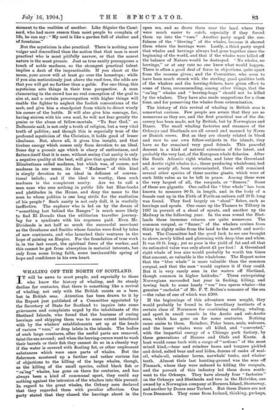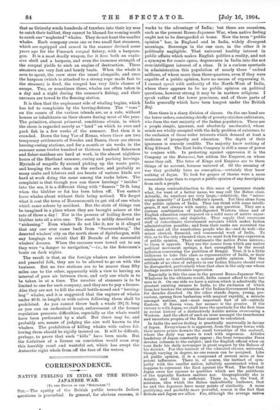I T will be news to most people, and especially to
those who know the history of whaling, and its steady decline for centuries, that there is something like a revival of whaling, not only with the British coasts as a base, but in British seas. Attention has been drawn to it by the Report just published of a Committee appointed by the Secretary of State for Scotland to inquire into some grievances and complaints urged by the inhabitants of the Shetland Islands, who found that the business of curing herrings and- shipping them was to some extent interfered with by the whalers' establishments set up at the heads of various " voes," or deep inlets in the islands. The bodies of such large creatures, after the useful parts are removed, taint the sea around; and when the herring-curers want to wash their barrels or their fish they cannot do so in a cleanly way if the water is covered with floating fat, or other unpleasant substances which were once parts of whales. But the fishermen mustered up a further and rather curious list of objections to the killing of the large whales, though, as the killing of the small species, called black fish or " ca'ing" whales, has gone on there for centuries, and has always been a kind of communal sport, they could say nothing against the intrusion of the whalers into this pursuit. In regard to the great whales, the Orkney men declared that they regarded them with peculiar affection. One party stated that they chased the herrings about in the
open sea, and so drove them near the land, where they were much easier to catch, especially if they forced them up into the " voes.!' Another party urged the use- fulness of the "blowing of the whales, because it showed them where the herrings were. Lastly, a third party urged that whales and herrings always had gone together since the beginning of the world, and that if the whales were killed off the balance of Nature would be destroyed. "No whales, no herrings," or at any rate no one knew what would happen. There is often a good deal of force in objections, quite apart from the reasons given ; and the Committee, who seem to have been much struck with the sterling good qualities both of the whalers and the herring-fishers, have given effect to some of them, recommending, among other things, that the " ca'ing " whales and " herring-hogs " should not be killed by the whalers. They have also made suggestions for a close time, and for preserving the whales from extermination.
The history of this revival of whaling in British seas is somewhat curious. Few people are aware that they are so numerous as they are, and the first practical use of the dis- covery has been made, not by British, but by Norwegians and Danes. The small whaling factories and steamers of the Orkneys and Shetlands are all owned and manned by Norse or Danish crews. But as they are closely related in blood and race to our own fellow-subjects in the islands, they have so far remained very good friends. This peaceful descent is a kind of natural extension of the latest, and probably the very last, of the European whale fisheries. After the South Atlantic right whales, and later the Greenland and Arctic right whales (i.e., those producing whalebone), had all, or nearly all, been exterminated, there still remained several other species of these marine giants, which were of such little value as to be left in peace. Among these were the very largest of all, the rorquals, or " finners." Some of these are gigantic. One called the "blue whale" has been known to measure 90 ft. in length, and in the body of a female cast up in the Firth of Forth an unborn calf 20 ft. long was found. They feed largely on "shoal" fishes, such as herrings and sprats. One came up the Thames to Tilbury in 1887 in pursuit of a shoal of sprats, and another up the Medway in the following year. In the seas round the Shet- lands these immense cetacea are quite numerous. The common rorqual, or " finner," of the whalers cruises from thirty to eighty miles from the land to the north and north- west. The Committee had the good luck to see one brought to shore, newly killed and glistening with deep-blue and white. It was 68 ft. long ; yet so poor is the yield of fat and oil that its estimated value was only about El per foot ! A Greenland right whale of less size would probably be worth ten times that amount, so valuable is the whalebone. The Report notes that the "blue whale" is more valuable than the common rorqual, and that the men 'would capture it if they could. But it is very rarely seen in the waters off Shetland, though common in higher latitudes." These enterprising Norwegians succeeded last year in finding, killing, and towing back to some lonely " voe" two sperm whales—the genuine " cachalot " of Mr. F. T. Bullen's romance of the sea —the value of one of which was 000.
If the beginnings of this adventure were sought, they would probably be found in the hereditary instincts of a certain class of Norsemen for combining sealing, whaling, and sport in small vessels in the Arctic and sub-Arctic seas, which has gone on for some centuries. Nothing came amiss to them. Reindeer, Polar bears, seals, walruses, and the lesser whales were all killed, and "converted," with the impartial energy of a Chicago pork factory, by these generations of Hawes and Olafs and Knuts. A boat would come back with a cargo of "notions" of the most mixed kind,—bear and reindeer hams and tongues pickled and dried, salted bear and seal hides, dozens of casks of seal- oil, whale-oil, reindeer horns, narwhals' tusks, and whales' teeth. Almost their last hunting-ground was the seas off Finmark, where they were reduced to killing the rorquals, and the pursuit of this industry led them down south- west to the Orkneys. They have already four "factories" on the Orkneys and Shetlands and two in the Hebrides, one owned by a Norwegian company at Bernera Island, Stornoway, and another by Danes near Tarbert. But these Danes are not from Denmark. They come from Iceland, thinking, perhaps, that as Grimsby sends hundreds of trawlers into their icy seas to catch their halibut, they cannot be blamed for coming south to catch our "neglected" whales. They do not hunt the smaller whales. Each company owns one or two small fast steamers, which are equipped and armed in the manner devised some years ago for the Finmark rorqual fishery, with a harpoon- gun. It is a most deadly weapon, for it fires both an explo- sive shell and a harpoon, and even the immense strength of the rorqual yields to such an engine of destruction. These steamers are very fast and handy boats. When the whale is seen to spout, the crew steer the vessel alongside, and once the harpoon (which is attached to a strong rope made fast to the steamer) is fired, the rorqual has very little chance of escape. Two, or sometimes three, whales are often taken in a day and a night during the summer's fishing, and their carcases are towed to the flensing station.
It is then that the unpleasant side of whaling begins, which has led to complaints by the herring-fishers. The " voes " on the coasts of the various islands are, as a rule, without houses or inhabitants on their shores during most of the year. The primitive, almost primeval, conditions obtain, in which the shore is regarded merely as "land" on which to cure and pack fish in a few weeks of the summer. But then it is crowded. Down the long Voe of Ronas, where there are two temporary settlements of Swedes and Danes, there are eleven herring-curing stations, and for a month or six weeks in the summer some twelve hundred or thirteen hundred fishermen and fisher-maidens are hard at work, in the almost flightless hours of the Shetland summer, curing and packing herrings. Myriads of seagulls fly around picking up the waste parts, and keeping the sea clean on the surface, and probably as many crabs and lobsters and sea beasts of various kinds are hard at work doing the same among the rocks below. The complaint is that though you can throw herrings' " insides " into the sea, it is a different thing with " finners " 70 ft. long when the blubber or fat has been taken off. You cannot leave whales about without their being noticed. We forget what it cost the town of Bournemouth to get rid of one whale which came ashore by accident. But the state of things can be imagined in a place where they are brought ashore at the rate of three a day ! Nor is the process of boiling down the blubber into oil a nice one. The smell is mildly described as "sickening." Even whalers do not like it, nor is it alleged that any one ever came back from "Stneeremburg," the deserted whalers' city on the north shore of Spitzbergen, with any longings to revisit that El Dorado of the successful whalers' dreams. When the carcases were towed out to sea they were "a danger to navigation,"—i.e., to the fishermen's boats on dark nights.
The result is that, as the foreign whalers are industrious and peaceful folk, they are to be allowed to go on with the business. But no two stations are to be nearer than fifty miles one to the other, apparently with a view to leaving an interval of pure air between them, and only one whale is to be taken in at a time. The number of steamers is to be limited to one for each company, and they are to pay a license.
Also they are not to kill the small bottle-nosed and "herring- hog" whales, and it is suggested that the capture of whales under 40 ft. in length or with calves following them shall be prohibited. As you cannot throw back a whale 39i ft. long as you can an undersized trout, enforcement of the former regulation presents difficulties, especially as the whale would have been perforated by a shell. But there may be, and probably are, means of judging the size well known to the whalers. The prohibition of killing whales with calves fol- lowing them should be rigidly insisted on. It will be difficult, perhaps, to prove that such "kills" have been made. But the forfeiture of a license on conviction would soon stop this horribly cruel and wasteful act, which has swept the Antarctic right whale from off the face of the waters.



































 Previous page
Previous page